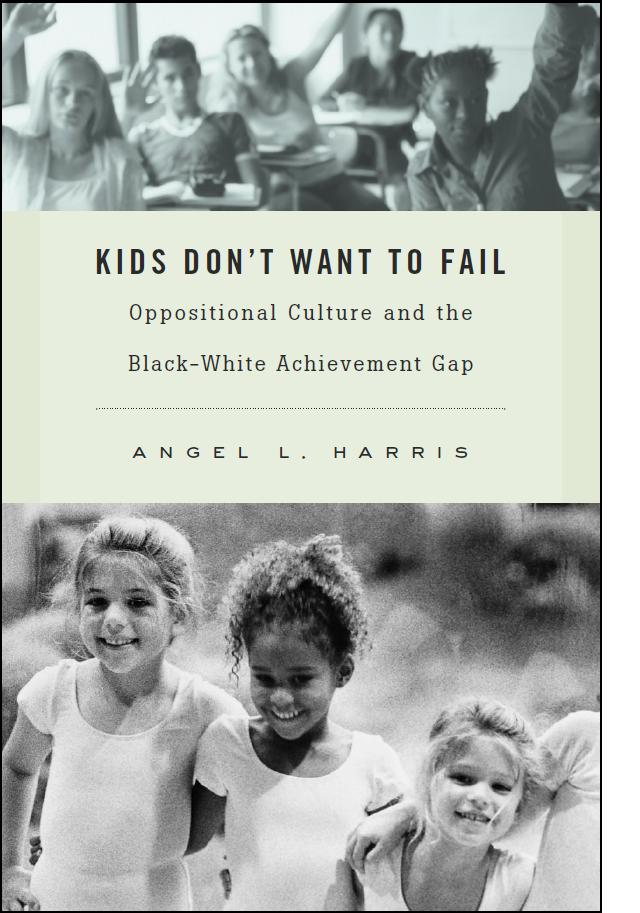Kids Don't Want to Fail: Oppositional Culture and the Black-White Achievement Gap
Harvard University Press


|
|
|
|
|
|
|
Phase I: Research on the
Oppositional Culture Thesis
Scholarship - Phase I
I began my research agenda by interacting with what is arguably the most popular explanation for group differences in academic investment: the oppositional culture explanation (or resistance model). Although numerous theories have been used to explain the racial differences in educational outcomes, the oppositional culture theory (or “resistance model”)—associated with the work and ideas of anthropologist and educational theorist John Ogbu—has received widespread attention among both academics and teachers. The theory provides a compelling link between socio-economic conditions and individuals’ behavior. It posits that black Americans’ knowledge or belief that the system of social mobility in the U.S. has been rooted in educational and occupational discrimination based on race leads many of them to mentally withdraw from the schooling process, which is a rational and adaptive response to their caste-like minority status (Read more about the theory). The first phase of my research program provides a rigorous and thorough assessment of the theory to determine whether researchers and policy makers should reconsider the extent to which they attribute blacks’ lower school achievement to a culture of school resistance.
Program Description
My first study on this issue (Harris 2006)—published in Social Forces (Read Article)—was a test of the resistance model that captured the theory’s multi-dimensionality. I used panel data that contains a unique combination of measures that allowed for five key tenets of the theory to be tested. I examined whether black youth fared worse than whites on 1) perceptions of returns to education and limited opportunities, 2) affect toward schooling, 3) efforts to improve academically and school resistance, 4) negative sanctioning by peers for good school performance (the “acting white” hypothesis), and 5) negative and positive peer culture. This study was also the first to provide a formal test of the theory’s maturation component—the notion that black youth become more resistant to schooling over time compared to whites.
Menu
In my second study (Harris 2008)—published in Social Science Quarterly (Read Article)—I tested the proposition that blacks disengage from school because of perceptions that education will not pay off for them. Previous studies reach conflicting conclusions on this issue because they conflate two forms of beliefs about social mobility (i.e., perceived returns to education or value of school and perceived barriers despite schooling). Ogbu may have inadvertently contributed to this lack of clarity. His explanation of the theory often merges beliefs about the value of school and beliefs about the barriers despite schooling into perceived returns to education. For instance, Ogbu (1991:53) writes that “[Blacks] have come to view the inadequate and unequal reward of education as a part of the institutionalized discrimination structure which getting an education cannot eliminate.” Describing the belief of the extent to which one will be rewarded (value of school) as part of the barriers that schooling cannot overcome leaves no clear distinction between the two concepts. Instead one gets the notion that they are substantively equivalent; perceptions of low rewards must always be accompanied by perceptions of high barriers. Thus, by finding that blacks perceive greater barriers than whites, proponents of the resistance model assume that they must perceive lower educational returns. Similarly, by finding blacks have greater perceptions of educational returns than whites, opponents of the resistance model disregard perceptions of barriers. The lack of distinction between these concepts was a critical deficit in previous studies of the oppositional culture theory that left us with an incomplete understanding of how the prevailing system of social mobility influences students’ schooling behavior. To address this gap, I examined whether blacks 1) attribute less value to schooling, 2) perceive greater barriers that education will not help them overcome, and 3) estimated the effect that these beliefs have on academic achievement and the likelihood of enrolling in college.
Despite the substantial amount of research on the resistance model, previous studies did not rule out the possibility that students’ behaviors and attitudes are endogenous to their prior skill levels. Within the context of the oppositional culture theory, the emphasis is placed on culture. Previous studies typically conduct black-white comparisons on a series of attitudes and behaviors. Blacks’ advantage on negative schooling attitudes or behaviors reflects a finding consistent with the theory. Prior academic skills often do not enter the conceptual equation because achievement generally does not serve as a measure of culture; the spotlight is on the contextual climate that promotes a culture of underachievement rather than achievement itself. My concern with these analyses is that the estimated effects of oppositional schooling behaviors and attitudes might be overestimated due to the omission of students’ skill level prior to the theory’s applicability (about grade 7-8 when youths are beginning to learn/understand the opportunity structure). Therefore, I examined whether the effect of oppositional schooling behaviors and attitudes on school achievement actually reflect the cognitive skills of students prior to entering high school (Harris and Robinson 2007)—published in Sociology of Education (Read Article).
In the next study I turned my focus to strategies that might help blacks achieve better in school. Fordham and Ogbu (1986) note that since black youths and the larger black community have a culture that is oppositional to mainstream American society, blacks who wish to maintain academic success and achieve upward socioeconomic mobility must adopt a raceless persona. Therefore, in collaboration with Kris Marsh, assistant professor at the University of Maryland, I conducted the first quantitative study to examine whether a raceless persona leads to better educational outcomes for blacks in high school than a non-raceless persona (Harris and Marsh 2010). Specifically, I examined whether race/ethnic connection among blacks in high school is associated with school achievement, educational aspirations, value attributed to schooling, and detachment from schooling. This study will appear in the December 2010 issue of the Social Science Quarterly (Read Article).
My work on the oppositional culture theory has led to my first book manuscript (Harvard University Press). The book, while in line with my earlier research, goes beyond my past studies and expands upon the literature by addressing a comprehensive model of oppositional culture and introducing new analysis. For example, I conduct an assessment of the implications that parents’ experiences with the opportunity structure have for youth perceptions of opportunity and academic orientation. The intergenerational transmission of beliefs about the opportunity structure has not received much attention within the context of the resistance model. I also use two nationally representative samples of young people in England. Although the theory was intended to provide a cross-cultural framework for understanding how marginalized groups orient themselves toward education, an empirical assessment of the cross-cultural dimension of the framework remains a void in the literature. The book uses a richer collection of measures than found in previous studies (over 150 outcomes from six datasets), including time diaries, and is the first quantitative assessment of the framework within a non-U.S. context.
You can order my books at:
http://www.barnesandnoble.com/c/angel-l.-harris
http://www.amazon.com/Kids-Dont-Want-Fail-Oppositional/dp/0674057724
